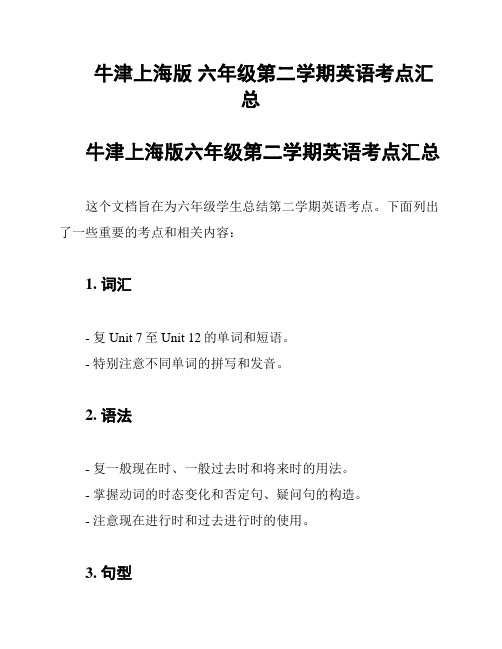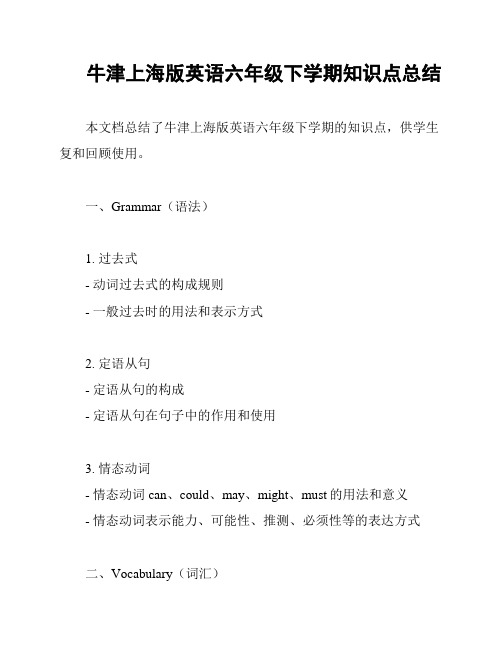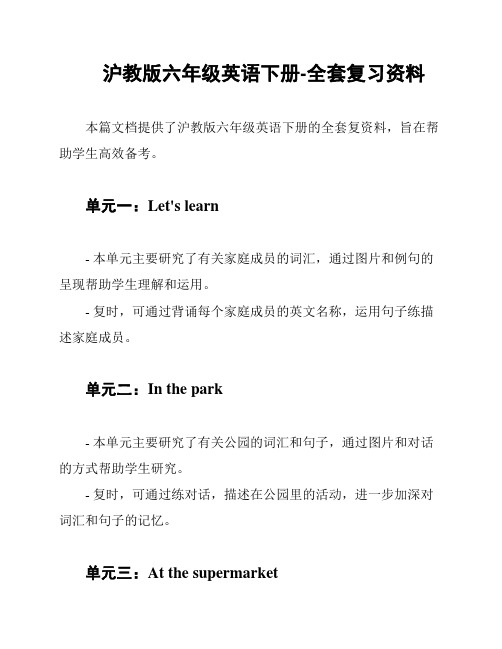上海位育初级中学小学英语六年级下册期末知识点(含答案)
牛津上海版 六年级第二学期英语考点汇总

牛津上海版六年级第二学期英语考点汇
总
牛津上海版六年级第二学期英语考点汇总
这个文档旨在为六年级学生总结第二学期英语考点。
下面列出了一些重要的考点和相关内容:
1. 词汇
- 复Unit 7至Unit 12的单词和短语。
- 特别注意不同单词的拼写和发音。
2. 语法
- 复一般现在时、一般过去时和将来时的用法。
- 掌握动词的时态变化和否定句、疑问句的构造。
- 注意现在进行时和过去进行时的使用。
3. 句型
- 复基本句型:主语+谓语+宾语。
- 研究一些常用的短语和句型,如“Can you...?"、"I can't..."、"How often do you...?"等。
4. 阅读理解
- 阅读并理解课文中的重要信息和细节。
- 学会根据上下文猜测词义。
- 提高阅读速度和阅读理解能力。
5. 口语表达
- 多参与口语练,提高口语表达能力。
- 学会用英语进行日常交流,包括问候、介绍自己、描述事物等。
6. 听力训练
- 提高听力理解能力,通过听力练来听懂并理解对话和短文。
- 学会根据听到的内容回答问题。
以上是牛津上海版六年级第二学期英语的考点汇总。
希望这份文档对大家备考有所帮助。
祝你们考试顺利!。
牛津上海版英语六年级下学期知识点总结

牛津上海版英语六年级下学期知识点总结
本文档总结了牛津上海版英语六年级下学期的知识点,供学生复和回顾使用。
一、Grammar(语法)
1. 过去式
- 动词过去式的构成规则
- 一般过去时的用法和表示方式
2. 定语从句
- 定语从句的构成
- 定语从句在句子中的作用和使用
3. 情态动词
- 情态动词can、could、may、might、must的用法和意义
- 情态动词表示能力、可能性、推测、必须性等的表达方式
二、Vocabulary(词汇)
1. 动词短语
- 动词短语的构成和用法
- 常用的动词短语及其意义
2. 名词短语
- 名词短语的构成和用法
- 常用的名词短语及其意义
3. 形容词和副词
- 形容词和副词的构成和用法
- 常用的形容词和副词及其意义
三、Reading(阅读)
1. 阅读理解
- 阅读理解题的解题技巧和策略- 阅读理解题型的种类和难度分布
2. 短文阅读
- 熟悉短文阅读中常见的词汇和句子结构
- 提高对短文主旨和细节的理解能力
四、Writing(写作)
1. 书信写作
- 书信写作的格式和语言表达
-如何正确使用称呼和结束语
2. 日记写作
- 日记写作的格式和内容要求
- 如何描述事件和个人感受
以上是牛津上海版英语六年级下学期的知识点总结。
希望同学们能够仔细复,并在考试中取得好成绩!。
沪教版六年级英语下册-全套复习资料

沪教版六年级英语下册-全套复习资料本篇文档提供了沪教版六年级英语下册的全套复资料,旨在帮助学生高效备考。
单元一:Let's learn- 本单元主要研究了有关家庭成员的词汇,通过图片和例句的呈现帮助学生理解和运用。
- 复时,可通过背诵每个家庭成员的英文名称,运用句子练描述家庭成员。
单元二:In the park- 本单元主要研究了有关公园的词汇和句子,通过图片和对话的方式帮助学生研究。
- 复时,可通过练对话,描述在公园里的活动,进一步加深对词汇和句子的记忆。
单元三:At the supermarket- 本单元主要研究了有关超市的词汇和句子,通过图片和情景的展示帮助学生研究。
- 复时,可通过模拟超市购物的情境,练对话和表达购物需求。
单元四:At the farm- 本单元主要研究了有关农场的词汇和句子,通过图片和对话的方式帮助学生研究。
- 复时,可通过回忆和描述农场的动物、农作物等内容,加深对词汇和句子的记忆。
单元五:At the zoo- 本单元主要研究了有关动物园的词汇和句子,通过图片和对话的方式帮助学生研究。
- 复时,可通过练对话,描述动物园的动物和活动,加深对词汇和句子的印象。
单元六:In the mountains- 本单元主要研究了有关山区的词汇和句子,通过图片和情境的展示帮助学生研究。
- 复时,可通过回忆、描述山区的景物和活动等内容,巩固词汇和句子的掌握。
单元七:At the beach- 本单元主要研究了有关海滩的词汇和句子,通过图片和对话的方式帮助学生研究。
- 复时,可通过模拟海滩的情境,练对话和表达海滩上的活动。
单元八:At the hospital- 本单元主要研究了有关医院的词汇和句子,通过图片和情景的展示帮助学生研究。
- 复时,可通过回顾和描述医院里的场景和医疗服务,加深对词汇和句子的记忆。
以上就是沪教版六年级英语下册的全套复习资料。
希望这份资料能帮助学生们复习英语知识,更好地备考。
上海六年级英语下学期最详细的知识点

下面是上海六年级英语下学期最详细的知识点:Unit 7: Let's Celebrate- Vocabulary: festival, wear, costume, mask, celebrate, organize, parade- Grammar: Future tense (will + base form), was/were goingto (expressing future plans/intentions)Unit 8: My Family- Vocabulary: family members (grandmother, grandfather, aunt, uncle), cousin, only child, divorced parents, stepmother, stepsister, stepbrother- Grammar: Possessive pronouns (my, your, his, her, our, their), can for abilityUnit 9: On the Farm- Vocabulary: farm animals (horse, sheep, cow, duck, chicken), animal sounds- Grammar: There is/There are, countable and uncountable nounsUnit 10: We're Nature Lovers- Vocabulary: nature, environment, pollution, garbage, recycle, protect- Grammar: Present Continuous tense (be + present participle)Unit 11: Our Hobbies- Vocabulary: hobbies (reading, swimming, dancing, painting, collecting stamps), chess, puzzle, orchestra, instrument - Grammar: Present Simple tense (basic form of the verb)Unit 12: In the Future- Vocabulary: transportation (car, bicycle, train, subway, helicopter), future jobs (pilot, astronaut, robot engineer) Unit 13: At the Zoo- Vocabulary: zoo animals (elephant, giraffe, lion, tiger, monkey), zookeeper, cage, enclosure- Grammar: Past Simple regular and irregular verbsUnit 14: We're Going Shopping- Vocabulary: clothing items (shirt, pants, dress, socks, shoes), department store, cashier, fitting room- Grammar: Imperative sentences, have to (expressing obligation)Unit 15: Our Favourite Food- Vocabulary: food (hamburger, noodles, rice, salad, pizza, ice cream), vegetables, fruits, drinks- Grammar: Countable and uncountable nouns, plural nounsUnit 16: Our Trip to London- Vocabulary: places in London (Big Ben, Tower of London, Buckingham Palace, London Eye, Trafalgar Square), landmarks, sightseeing, souvenir- Grammar: Past Continuous tense (was/were + present participle)以上是上海六年级英语下学期的最详细的知识点。
上海六年级英语知识点下

上海六年级英语知识点下I. Present Tense1. DefinitionThe present tense is used to describe actions happening at the present time or general truths.2. Formation- For regular verbs, the present tense is formed by adding "-s" or "-es" to the base form of the verb for the third person singular.Example: He plays tennis every Sunday.- Irregular verbs have their own specific forms.Example: She goes to school by bus.3. Usage- To describe current actionsExample: I am reading a book now.- To state facts or general truthsExample: The sun rises in the east.- To express habitual actionsExample: I drink coffee every morning.- To discuss future events that are part of a schedule or timetable Example: The train leaves at 9 a.m. tomorrow.II. Past Tense1. DefinitionThe past tense is used to describe actions that have already happened.2. Formation- For regular verbs, the past tense is formed by adding "-ed" to the base form of the verb.Example: They visited their grandparents last weekend.- Irregular verbs have their own specific forms.Example: He ate lunch at noon.3. Usage- To talk about completed actions in the pastExample: I watched a movie last night.- To describe past habits or repeated actionsExample: They always played soccer on Sundays.- To express a past state or conditionExample: She was a teacher before she retired.- To narrate stories or eventsExample: Once upon a time, there lived a princess.III. Future Tense1. DefinitionThe future tense is used to describe actions that will happen after the present time.2. Formation- The future tense is formed using the auxiliary verb "will" or "shall" before the base form of the verb.Example: I will visit my friend tomorrow.3. Usage- To make predictions or express future eventsExample: It will rain tomorrow.- To express intentions or plansExample: She will go shopping after school.- To offer help or make promisesExample: I will help you with your homework.IV. Present Continuous Tense1. DefinitionThe present continuous tense is used to describe actions that are happening at the present moment or during a specific time period.2. Formation- The present continuous tense is formed by using the present tense of the verb "to be" (am, is, are) and adding the present participle (-ing form) of the main verb.Example: She is playing guitar right now.3. Usage- To describe actions happening at the present momentExample: They are studying for their exam.- To talk about temporary situations or actionsExample: He is staying with his grandparents this week.- To express annoyance about a repeated actionExample: You are always interrupting me.V. Past Continuous Tense1. DefinitionThe past continuous tense is used to describe actions that were happening in the past at a specific time or over a period.2. Formation- The past continuous tense is formed by using the past tense of the verb "to be" (was, were) and adding the present participle (-ing form) of the main verb.Example: She was studying when the phone rang.3. Usage- To describe actions that were in progress at a specific time in the pastExample: They were playing soccer at 7 p.m. yesterday.- To provide background information in a narrativeExample: The sun was shining, and birds were singing as they walked in the park.VI. Future Continuous Tense1. DefinitionThe future continuous tense is used to describe ongoing actions that will happen in the future.2. Formation- The future continuous tense is formed by using the future tense of the verb "to be" (will be, shall be) and adding the present participle (-ing form) of the main verb.Example: I will be studying at this time tomorrow.3. Usage- To describe actions that will be in progress at a specific time in the futureExample: They will be traveling to Europe next month.- To express assumptions or predictions about the futureExample: She will be working late tonight, so she won't be able to meet us.VII. ConclusionUnderstanding the different tenses in English is essential for clear communication. By using the appropriate tense, we can accurately express when an action takes place or its duration in time. Practice using these tenses in various contexts to enhance your fluency in English.。
上海英语六年级下知识点

上海英语六年级下知识点一、词汇与语法知识点1. 时态与语态在六年级下学期的英语学习中,同学们会学习到更多的时态和语态。
比如,过去进行时用于描述过去某个时间正在进行的动作,如:I was playing football yesterday. 被动语态则用于强调动作的接受者,如:The cake was eaten by Tom.2. 名词单复数在六年级下学期的英语课程中,同学们需要掌握名词的单复数形式。
名词的复数形式有一般变化规则,如:book - books, cat - cats,也有特殊变化规则,如:child - children, woman - women.3. 形容词和副词的比较级与最高级同学们需要学习形容词和副词的比较级和最高级形式。
比如,大于两个人或事物的比较用比较级形式,如:Jim is taller than Tom. 最高级则用于三个或三个以上人或事物的比较,如:Kate is the tallest girl in the class.4. 介词短语学生们需要学会正确使用介词短语来描述位置、时间和原因等。
例如,in front of表示在前面,at the back表示在后面,on the left表示在左边,on the right表示在右边。
二、阅读理解1. 阅读理解技巧在六年级下学期的英语学习中,同学们会遇到更多的阅读理解题。
在做阅读理解时,同学们需要培养正确阅读理解的技巧,如:通过关键词寻找答案、理解文章的主旨等。
同时,同学们还需提高阅读速度和理解能力,以迅速抓住文章的重点。
2. 阅读材料选择在阅读理解中,同学们会接触到各种各样的阅读材料,如短文、对话等。
这些材料往往以英语语言环境下的生活、学习、旅行等为话题,同学们需要学会根据文章的特点选择合适的解题方法。
三、写作技巧1. 写作结构六年级下学期的英语课程中,同学们需要继续学习写作技巧。
写作时,同学们需要注意采用合适的结构,包括引言、主体和结尾。
上海六年级下英语知识点

上海六年级下英语知识点一、语法知识点在六年级下学期的英语学习中,学生们将继续巩固和扩展自己的语法知识。
以下是本学期重点掌握的一些语法知识点:1. 时态:学生们需要学习和掌握一般现在时、一般过去时、将来时等时态的构成和用法。
2. 名词的单复数:学生们需要了解可数和不可数名词的区别,以及单数和复数形式的变化规则。
3. 形容词和副词:学生们需要学会使用形容词来修饰名词,以及副词来修饰动词和形容词。
4. 代词:学生们需要学会使用不同种类的代词,如主格代词、宾格代词、物主代词等。
5. 介词:学生们需要了解一些常用介词的用法,以及介词短语在句子中的作用。
6. 定冠词和不定冠词:学生们需要学习如何正确使用定冠词“the”和不定冠词“a/an”。
7. 比较级和最高级:学生们需要学会使用比较级和最高级来表示事物之间的比较关系。
8. 句型转换:学生们需要学会进行句型转换,如陈述句变为否定句或疑问句等。
二、词汇知识点学生们在六年级下学期的英语学习中也需要扩充自己的词汇量。
以下是一些需要掌握的词汇知识点:1. 动词:学生们需要学会使用一些常见的动词,如play、study、eat等,以及它们的过去式和过去分词形式。
2. 名词:学生们需要学会使用一些常见的名词,如book、car、dog等,以及它们的复数形式。
3. 形容词:学生们需要学会使用一些描述性的形容词,如big、small、happy等。
4. 副词:学生们需要学会使用一些常见的副词,如often、quickly、slowly等。
5. 介词:学生们需要学会使用一些常用的介词,如in、on、at 等,以及它们在句子中的正确位置。
6. 数词:学生们需要学会使用基数词和序数词,如one、first、two、second等。
7. 颜色:学生们需要学会用英语表达一些常见的颜色,如red、blue、green等。
8. 季节和月份:学生们需要学会用英语表达四个季节和十二个月份的名称。
上海英语六年级下册知识点

上海英语六年级下册知识点英语是一门重要的国际语言,学好英语对于我们的将来发展至关重要。
下面是上海英语六年级下册的知识点总结,希望对同学们的学习有所帮助。
一、语法知识点1. 一般现在时在英语中,一般现在时用于描述经常发生或普遍真理的情况。
它的基本句型是主语+动词原形。
例如:I play tennis every Sunday.2. 一般过去时一般过去时用于描述过去发生的动作或状态。
一般过去时的动词通常以-ed结尾,或者按照一般过去时的规则变化。
例如:She watched a movie yesterday.3. 一般将来时一般将来时用于描述将来要发生的动作或状态。
它的基本句型是将来时助动词+动词原形。
例如:I will go to Shanghai next week.4. 现在进行时现在进行时用于描述现在正在进行的动作。
它的基本句型是主语+be+动词-ing形式。
例如:They are playing football in the park.5. 过去进行时过去进行时用于描述过去某个时间正在进行的动作。
它的基本句型是主语+was/were+动词-ing形式。
例如:She was studying English last night.6. 一般现在进行时一般现在进行时用于描述现在经常进行的动作。
它的基本句型是主语+am/is/are+动词-ing形式。
例如:They are always playing basketball after school.二、词汇知识点1. 常见动词学习英语的过程中,掌握常见动词是非常重要的。
一些常见动词包括:study(学习)、read(阅读)、write(写作)、listen (听)、speak(说)、play(玩)、watch(观看)等。
2. 频度副词频度副词用于描述动作的频率。
一些常见的频度副词包括:always(总是)、often(经常)、sometimes(有时候)、never (从不)等。
- 1、下载文档前请自行甄别文档内容的完整性,平台不提供额外的编辑、内容补充、找答案等附加服务。
- 2、"仅部分预览"的文档,不可在线预览部分如存在完整性等问题,可反馈申请退款(可完整预览的文档不适用该条件!)。
- 3、如文档侵犯您的权益,请联系客服反馈,我们会尽快为您处理(人工客服工作时间:9:00-18:30)。
一、单选题1.(0分)John上课迟到了。
他应该对老师说:A. I'm hungry.B. I'm sorry.答案: B2.(0分)Joe问Alice:“明天天气怎样?”Alice告诉他:A. It's summer.B. It's a rainy day.答案: B3.(0分)选出不同类的单词()A. yesterdayB. last nightC. tomorrow答案: C4.(0分)Amy __________ long hair and big eyes.A. haveB. isC. has答案: C5.(0分)learnA. 离开B. 学习答案: B6.(0分)He dinner at 5:00 yesterday afternoon.A. ateB. eatsC. eat答案: A7.(0分)Did you play football______?A. next MondayB. nowC. last week答案: C8.(0分)learnA. 离开B. 学习答案: B二、选词填空9.(0分)Look at the bird. It's ________ (小的). ( small / big )答案: small10.(0分)What's your aunt? She's a ________(waiter/waitress).答案: waitress11.(0分)根据短文内容,选择合适的词组补全短文。
every morning. After breakfast I ________ School begins at eight a.m. We have four lessons in the morning and two in the afternoon. I like English, ________ and ________. We ________ at twelve. After school we have sports. I ________ playing ping-pong and football. I usually ________ before five pm. After supper I ________ my homework, watch TV or read newspaper. I ________ before ten.答案: years;get up;go to;Chinese;PE;have lunch;like;have supper;do;go to bed 12.(0分)Peter and Bob are ________(twin/twins) brothers.答案: twin13.(0分)你喜欢去农场玩吗?在农场里可以做什么呢?请你用所给的词填空。
每空只填一词,每词只用一次。
and my brother, Peter. Peter's ________ than me. He's five and I'm twelve. Last Saturday, Dad ________ us to our grandma's farm in his car. Grandma and Grandpa ________ on a farm near the sea. We like ________ there. There's always something exciting to ________ on their farm. On Sunday, we went to see the horses. Grandma showed us two new ________ horses. They had brown eyes and made ________noises(声音). We named them Cloudy and ________. We both ________ Mr. Jim, my grandma's oldest horse. Peter and I really loved that ________.答案: younger;took;live;going;do;baby;funny;Star;rode;holiday14.(0分)用所给单词的适当形式填空(2)Wu Yifan ________ some nice kites yesterday afternoon(3)—What does she do every evening?—She often________her homework.(4)Lily ________ her lunch at school on schooldays.(5)We should ________ books aloud in the morning.答案:(1)teaches(2)made(3)does(4)has(5)read_15.(0分)给下列动词选择正确的宾语成为正确的动词短语(2)do ________(3)take ________(4)play ________(5)ride ________答案:(1)C(2)E(3)D(4)B(5)A16.(0分)—Which ball is ________(big / bigger) , the yellow one or the red one?—The red one.答案: bigger三、情景交际17.(0分)Did you stay at home last weekend?答案: Yes, I did. / No, I didn't.18.(0分)根据问句选答语⑴What are you going to do this weekend?________ A. No, he didn't.⑵Did he ride a bike last night?________ B. He went to the beach.⑶What did your mother do yesterday?________ C. I went there by train.⑷Where did your uncle go yesterday?________ D. She read a book.⑸How did you go there?________ E. I'm going to visit my grandparents.答案: E;A;D;B;C19.(0分)选出各句的正确答语。
⑴How heavy is your brother?________ A. I often help my mother do housework.⑵How can I get to the post office?________ B. She's tall and pretty.⑶What do you often do on the weekend?________ C. Go straight and turn left at the school.⑷Who's older than you?________ D. He's 45 kilograms.⑸What's your English teacher like?________ E. John.答案: D;C;A;E;B四、句型转换20.(0分)They went fishing near the hill yesterday. (对画线部分提问)________ they ________ near the hill yesterday?答案: What;did do21.(0分)She often watches TV at night. (改为一般疑问句)________ she often ________ TV at night?答案: Does;watch22.(0分)My brother teaches English. (改一般疑问句)________your brother ________ English?答案: Does;teach23.(0分)She had an art class last Monday. (改为一般疑问句)________ she ________ an art class last Monday?答案: Did;have24.(0分)John is taller than Tom.(同义句)答案: Tom is shorter than John.25.(0分)It's hot in summer. (照样子写句子)答案: It's cold in winter.26.(0分)Wu Yifan went to Shanghai over his holiday.(对画线部分提问)________ ________ Wu Yifan ________ over his holiday?答案: Where;did;go27.(0分)She cleaned her room yesterday. (对画线部分提问)________ ________she ________yesterday?答案: What;did;do五、完形填空28.(0分)阅读短文,从A、B、C、D四个选项中选取最佳答案。
You say you'll have a two-week summer holiday and decide to travel a lot and visit as many new places as possible. I 1 it's a good idea. I'll tell you a story about my friend Mr. Bell. Last July he 2 in Europe. Europe is very beautiful, 3 his holiday was't very nice. Hevisited four countries, and was in 4 of the countries only three days. He visited quite a lotof museums and famous places, and was always 5 .Bell was on the train or bus almost every day. When he returned 6 Europe, he was very tired.So I think that you 7 better spend your holiday in a different way. It is 8 to travel with a friend to one country, and visit only one city. Choose a city 9 and you will be ableto have a good 10 on the seaside.1. A. am sure B. believe C. don't think D. don't hope2. A. was B. studies C. worked D. lived3. A. with B. and C. so D. but4. A. everyone B. either C. each D. all5. A. unhappy B. in a worry C. excited D. interested6. A. to B. in C. from D. for7. A. would B. should C. could D. had8. A. better B. happier C. quicker D. more interested9. A. in the countryside B. by the sea C. with museums D. away from Europe10. A. holiday B. swimming C. day D. place答案:(1)C;(2)A;(3)D;(4)C;(5)B;(6)C;(7)D;(8)A;(9)B;(10)A;29.(0分)完形填空Linda is a student. She likes 1 the piano very much. She likes 2 too next Friday, she is going to go shopping. She wants 3 a new skirt and some books. The supermarket is next to the bookstore. It's 4 . So she is going there by bus. After that, she is going to 5 her grandparents.1. A. playing B. plays C. playes2. A. danceing B. dance C. dancing3. A. buying B. to buy C. buys4. A. far B. big C. interesting5. A. visit B. visits C. visited答案:(1)A;(2)C;(3)B;(4)A;(5)A;30.(0分)完形填空A cat goes to a river every day. He wants to go 1 , but he can't catch 2 fish.One day he goes to the 3 as usual(像往常一样). Suddenly a fish comes up. He catches the fish. He is very 4 . The cat jumps up and down. He 5 to put the fish in the basket. He dances and sings. He shouts, "I have a fish. I have a fish." All his 6 come to see him." 7 is your fish? Let's have a 8 ." His friends say."It's there 9 the bank." The cat answers. But they 10 find the fish. When the cat jumps up and down, the fish jumps back into the river.1. A. to fish B. fishes C. fishing2. A. any B. some C. every3. A. lake B. sea C. river4. A. happy B. sad C. sorry5. A. catches B. eats C. forgets6. A. friends B. classmates C. family7. A. What B. Where C. When8. A. see B. look C. watch9. A. near B. between C. under10. A. do B. can C. can't答案:(1)C;(2)A;(3)C;(4)A;(5)C;(6)A;(7)B;(8)B;(9)A;(10)C;六、阅读理解31.(0分)读短文,判断对或错Hello, I'm Minnie. I went to Zhangjiajie with my father last summer. I went there by train. On the first day, I went to a nature park. I climbed mountains. I was so tired after climbing so many mountains. On the second day, I went to Fenghuang, I bought some presents for my mother and my brother. Of course, I took many nice pictures. I saw many nice clothes there. I had a good time on my holiday.(1)I went to Zhangjiajie by plane.(2)I climbed mountains on the first day.(3)I went to a park on the second day.(4)I bought some presents for my mother and father.(5)I took many nice pictures there.答案:(1)错误(2)正确(3)错误(4)错误(5)正确32.(0分)根据短文内容判断正误Mr. Brown lived in a small town, but he worked in a big city. So he moved there with his wife and two children last Tuesday. On the next day, Mr. Brown took his new car out and was washing it. When a friend came, the friend stopped and looked at the new car for a minute. Then Mr. Brown turned and saw him. The friend said, "That's a new car. Is it yours?" "Sometimes. "Mr. Brown answered. The friend was surprised slowly, "Well, when there's a party in town, my daughter, Jean drives it. When there's a football game, it's my son Joe's turn. When I have washed it and it looks really nice and clean, my wife Linda uses it. And when it needs cleaning, it'smine!"(1)Mr. Brown worked in a small town.(2)Mr. Brown had a new car.(3)Jean drove the car to the party in the town.(4)Joe used the car when there was a basketball game.(5)Mr. Brown washed the car when it was dirty.答案:(1)错误(2)正确(3)正确(4)错误(5)正确33.(0分)阅读对话, 选择正确的答案。
